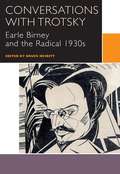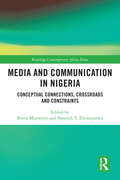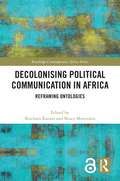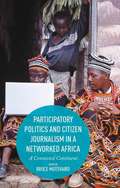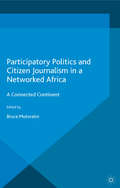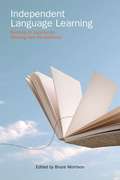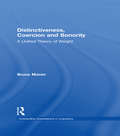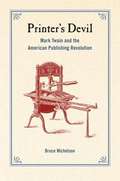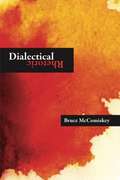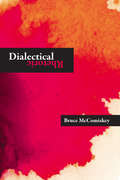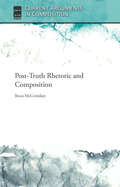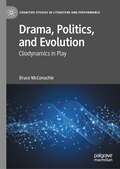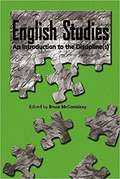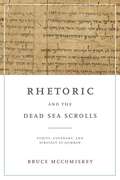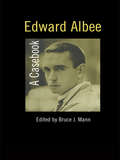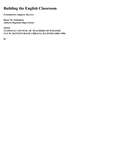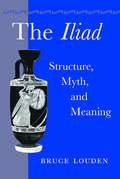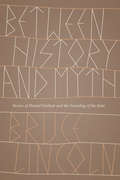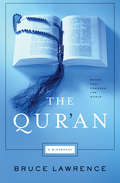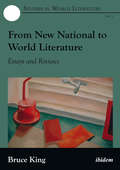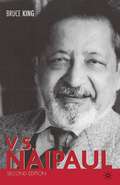- Table View
- List View
Language on a Leash
by Bruce O. BostonWhere the English language is concerned, professional writer and editor Bruce O. Boston sees himself "holding one end of a leash, at the other end of which is a language barking its head off, trying to tear off in every which direction..." In Language On A Leash, Boston presents a provocative collection of artful essays that examine the nuances and crannies of the English language. Called "a virtuoso performance," Language On A Leash will please word lovers everywhere with its diverse subjects and thoughtful discussions. Boston's clever observations about writing, editing, language, and usage will delight anyone who has ever put pen to paper.
Conversations with Trotsky: Earle Birney and the Radical 1930s (Canadian Literature Collection)
by Bruce NesbittThis collection presents all of Earle Birney’s known published and unpublished writings on Trotsky and Trotskyism for the very first time. It includes their correspondence as well as a selection of Birney’s letters and literary writings. Before he became one of Canada’s most influential and popular twentieth century poets, Earle Birney lived a double life. To his students and colleagues, he was an engaging university lecturer and scholar. But for seven years—from 1933 to 1940—the great Russian revolutionary Leon Trotsky was the focus of his writing and much of his life. During his years as a Trotskyist in Canada, the United States and England, Birney wrote extensively about Trotsky, corresponded with him, organized Trotskyist cells in two countries, and recruited on behalf of Trotskyism; he also lectured on Trotsky and interviewed him over the course of several days. One of his two novels is based on some of these activities. The collection traces the origins of Trotsky’s mistrust of “the British” to his experiences in Canada; shows Birney’s influence on a major shift in Trotsky’s policy of “entrism” in British politics; includes the largest body of Trotskyist criticism in Canadian literary history; and demonstrates the need for a radical re-reading of Birney’s poetry in light of his Trotskyism.
Media and Communication in Nigeria: Conceptual Connections, Crossroads and Constraints (Routledge Contemporary Africa)
by Bruce Mutsvairo and Nnamdi T. EkeanyanwuCommunication is changing rapidly around the world, particularly in Africa, where citizens are embracing digital technologies not only to improve not only interpersonal communication but also the state of their financial well-being. This book investigates these transformations in Nigeria’s booming communication industry. The book traces communications in Nigeria back to pre-colonial indigenous communications, through the development of telecommunication, broadcasting networks, the press, the Nigerian film industry (‘Nollywood’) and on to the digital era. At a time when Western voices still dominate the academic literature on communication in Africa, this book is noteworthy in drawing almost exclusively on the expertise of Nigerian-based authors, critiquing the discipline from their own lens and providing an important contribution to the decolonisation of communication studies. The authors provide a holistic analysis of the sector, encompassing print journalism, broadcast journalism, public relations, advertising, film, development communication, organisational communication and strategic communication. Analysis of the role of digital technologies is woven throughout the book, concluding with a final section theorising the future of communication studies in Nigeria in the light of the digital media revolution. Robust in its theoretical and methodological underpinnings, this book will be an important reference for researchers of media and communication studies, and those working on Africa specifically.
Decolonising Political Communication in Africa: Reframing Ontologies (Routledge Contemporary Africa)
by Bruce Mutsvairo Beschara KaramThis book uses decolonisation as a lens to interrogate political communication styles, performance, and practice in Africa and the diaspora. The book interrogates the theory and practice of political communication, using decolonial research methods to begin a process of self-reflexivity and the creation of a new approach to knowledge production about African political communication. In doing so, it explores political communication approaches that might until recently have been considered subversive or dissident: forms of political communication that served to challenge imposed western norms and to empower African citizens and their histories. Centring African scholarship, the book draws on case studies from across the continent, including Zimbabwe, South Africa, Nigeria and Ghana. This book will be of interest to students and scholars of politics, media and communication in Africa.
Participatory Politics and Citizen Journalism in a Networked Africa: A Connected Continent
by Bruce MutsvairoThis book investigates the role of citizen journalism in railroading social and political changes in sub-Saharan Africa. Case studies are drawn from research conducted by leading scholars from the fields of media studies, journalism, anthropology and history, who uniquely probe the real impact of technologies in driving change in Africa.
Participatory Politics and Citizen Journalism in a Networked Africa: A Connected Continent
by Bruce MutsvairoThis book investigates the role of citizen journalism in railroading social and political changes in sub-Saharan Africa. Case studies are drawn from research conducted by leading scholars from the fields of media studies, journalism, anthropology and history, who uniquely probe the real impact of technologies in driving change in Africa.
Independent Language Learning
by Bruce MorrisonIndependent learning is not a new concept for language educators but while teachers, curriculum designers and policy makers have embraced it as underpinning modern notions of education, it remains a dynamic and vibrant field for researchers and academics who aim to broaden its scope and deepen our understanding of how it may be applied most effectively both inside and outside the classroom. The book's authors use their experience of applying the concepts related to independent learning in various geographical, cultural and pedagogical tertiary level learning contexts to present new perspectives on how independent learning can inform and support policy, teaching methodology, curriculum development and the nurturing of successful learners. While the first section of the book provides a view of the field from three broad curriculum development viewpoints, the remaining chapters primarily focus on the experience of learners, teachers and curriculum developers in applying principles of learner autonomy, self-regulation and self-direction with various types of learner - each with their own identities, motivations, expectations and goals. These learner and teacher stories provide insights that are important for an understanding of some of the impacts an independent learning approach to language learning have on learners in various educational contexts. This book will be of value to pre-service and in-service teachers, curriculum developers and teacher educators working in diverse educational contexts in more fully appreciating the contribution an independent learning focus can make to successful learning.
Distinctiveness, Coercion and Sonority: A Unified Theory of Weight (Outstanding Dissertations in Linguistics)
by Bruce MorenThis volume proposes a unified weight theory that challenges traditionally held beliefs regarding the vowel/consonant dichotomy inherent in moraicity and illuminates many previously intractable issues.
Printer's Devil: Mark Twain and the American Publishing Revolution
by Bruce MichelsonThis book speaks about Mark Twain and the history of print culture in America.
Dialectical Rhetoric
by Bruce MccomiskeyIn Dialectical Rhetoric, Bruce McComiskey argues that the historical conflict between rhetoric and dialectic can be overcome in ways useful to both composition theory and the composition classroom. Historically, dialectic has taken two forms in relation to rhetoric. First, it has been the logical development of linear propositions leading to necessary conclusions, a one-dimensional form that was the counterpart of rhetorics in which philosophical, metaphysical, and scientific truths were conveyed with as little cognitive interference from language as possible. Second, dialectic has been the topical development of opposed arguments on controversial issues and the judgment of their relative strengths and weaknesses, usually in political and legal contexts, a two-dimensional form that was the counterpart of rhetorics in which verbal battles over competing probabilities in public institutions revealed distinct winners and losers.The discipline of writing studies is on the brink of developing a new relationship between dialectic and rhetoric, one in which dialectics and rhetorics mediate and negotiate different arguments and orientations that are engaged in any rhetorical situation. This new relationship consists of a three-dimensional hybrid art called "dialectical rhetoric," whose method is based on five topoi: deconstruction, dialogue, identification, critique, and juxtaposition. Three-dimensional dialectical rhetorics function effectively in a wide variety of discursive contexts, including digital environments, since they can invoke contrasts in stagnant contexts and promote associations in chaotic contexts. Dialectical Rhetoric focuses more attention on three-dimensional rhetorics from the rhetoric and composition community.
Dialectical Rhetoric
by Bruce MccomiskeyIn Dialectical Rhetoric, Bruce McComiskey argues that the historical conflict between rhetoric and dialectic can be overcome in ways useful to both composition theory and the composition classroom. Historically, dialectic has taken two forms in relation to rhetoric. First, it has been the logical development of linear propositions leading to necessary conclusions, a one-dimensional form that was the counterpart of rhetorics in which philosophical, metaphysical, and scientific truths were conveyed with as little cognitive interference from language as possible. Second, dialectic has been the topical development of opposed arguments on controversial issues and the judgment of their relative strengths and weaknesses, usually in political and legal contexts, a two-dimensional form that was the counterpart of rhetorics in which verbal battles over competing probabilities in public institutions revealed distinct winners and losers. The discipline of writing studies is on the brink of developing a new relationship between dialectic and rhetoric, one in which dialectics and rhetorics mediate and negotiate different arguments and orientations that are engaged in any rhetorical situation. This new relationship consists of a three-dimensional hybrid art called “dialectical rhetoric,” whose method is based on five topoi: deconstruction, dialogue, identification, critique, and juxtaposition. Three-dimensional dialectical rhetorics function effectively in a wide variety of discursive contexts, including digital environments, since they can invoke contrasts in stagnant contexts and promote associations in chaotic contexts. Dialectical Rhetoric focuses more attention on three-dimensional rhetorics from the rhetoric and composition community.
Post-Truth Rhetoric and Composition
by Bruce MccomiskeyPost-Truth Rhetoric and Composition is a timely exploration of the increasingly widespread and disturbing effect of “post-truth” on public discourse in the United States. Bruce McComiskey analyzes the instances of bullshit, fake news, feigned ethos, hyperbole, and other forms of post-truth rhetoric employed in recent political discourse. The book frames “post-truth” within rhetorical theory, referring to the classic triad of logos, ethos, and pathos. McComiskey shows that it is the loss of grounding in logos that exposes us to the dangers of post-truth. As logos is the realm of fact, logic, truth, and valid reasoning, Western society faces increased risks—including violence, unchecked libel, and tainted elections—when the value of reason is diminished and audiences allow themselves to be swayed by pathos and ethos. Evaluations of truth are deferred or avoided, and mendacity convincingly masquerades as a valid form of argument. In a post-truth world, where neither truth nor falsehood has reliable meaning, language becomes purely strategic, without reference to anything other than itself. This scenario has serious consequences not only for our public discourse but also for the study of composition.
Drama, Politics, and Evolution: Cliodynamics in Play (Cognitive Studies in Literature and Performance)
by Bruce McConachieThis book outlines the evolution of our political nature over two million years and explores many of the rituals, plays, films, and other performances that gave voice and legitimacy to various political regimes in our species’ history. Our genetic and cultural evolution during the Pleistocene Epoch bestowed a wide range of predispositions on our species that continue to shape the politics we support and the performances we enjoy. The book’s case studies range from an initiation ritual in the Mbendjela tribe in the Congo to a 1947 drama by Bertolt Brecht and include a popular puppet play in Tokugawa Japan. A final section examines the gradual disintegration of social cohesion underlying the rise of polarized politics in the USA after 1965, as such films as The Godfather, Independence Day, The Dark Knight Rises, and Joker accelerated the nation’s slide toward authoritarian Trumpism.
English Studies: An Introduction to the Discipline(s) (Refiguring English Studies)
by Bruce McComiskeyWell-known scholars in the field explore the important qualities and functions of English studies' constituent disciplines--Ellen Barton on linguistics and discourse analysis, Janice Lauer on rhetoric and composition, Katharine Haake on creative writing, Richard Taylor on literature and literary criticism, Amy Elias on critical theory and cultural studies, and Robert Yagelski on English education--and the productive differences and similarities among them that define English studies' continuing importance. <P><P> Faculty and students in both undergraduate and graduate courses will find the volume an invaluable overview of an increasingly fragmented field, as will department administrators who are responsible for evaluating the contributions of diverse faculty members but whose academic training may be specific to one discipline. <P><P> Each chapter of English Studies is an argument for the value--the right to equal status--of each individual discipline among all English studies disciplines, yet the book is also an argument for disciplinary integration.
Microhistories of Composition
by Bruce McComiskeyWriting studies has been dominated throughout its history by grand narratives of the discipline, but in this volume Bruce McComiskey begins to explore microhistory as a way to understand, enrich, and complicate how the field relates to its past. Microhistory investigates the dialectical interaction of social history and cultural history, enabling historians to examine uncommon sites, objects, and agents of historical significance overlooked by social history and restricted to local effects by cultural history. This approach to historical scholarship is ideally suited for exploring the complexities of a discipline like composition. Through an introduction and eleven chapters, McComiskey and his contributors—including major figures in the historical research of writing studies, such as Louise Wetherbee Phelps, Kelly Ritter, and Neal Lerner—develop focused narratives of particular significant moments or themes in disciplinary history. They introduce microhistorical methodologies and illustrate their application and value for composition historians, contributing to the complexity and adding momentum to the emerging trend within writing studies toward a richer reading of the field’s past and future. Scholars and historians of both composition and rhetoric will appreciate the fresh perspectives on institutional and disciplinary histories and larger issues of rhetorical agency and engagement enacted in writing classrooms that are found in Microhistories of Composition. Other contributors include Cheryl E. Ball, Suzanne Bordelon, Jacob Craig, Matt Davis, Douglas Eyman, Brian Gogan, David Gold, Christine Martorana, Bruce McComiskey, Josh Mehler, Annie S. Mendenhall, Kendra Mitchell, Antony N. Ricks, David Stock, Kathleen Blake Yancey, Bret Zawilski, and James T. Zebroski.
Rhetoric and the Dead Sea Scrolls: Purity, Covenant, and Strategy at Qumran
by Bruce McComiskeyDiscovered in 1947, the Dead Sea Scrolls are a collection of ancient Israelite documents, many of which were written by a Jewish sectarian community at Qumran living in self-exile from the priesthood of the Second Temple. This first book-length study of the rhetoric of these texts illustrates how the Essenes employed different rhetorics over time as they struggled to understand God’s word and their mission to their people, who seemed to have turned away from God and his purposes.Applying methods of rhetorical analysis to six substantive texts—Miqṣat Maʿaśeh ha-Torah, Rule of the Community, Damascus Document, Purification Rules, Temple Scroll, and Habakkuk Pesher—Bruce McComiskey traces the Essenes’ use of rhetorical strategies based on identification, dissociation, entitlement, and interpretation. Through his analysis, McComiskey uncovers a unique, fascinating story of an ancient religious community that had sought to reintegrate into Temple life but, dejected, instead established itself as the new covenant people of God for this world, only to turn ultimately to a trust in a metaphysical afterlife.Presenting forms of ancient Jewish rhetoric largely uninfluenced by classical rhetoric, this book broadens our understanding of human and religious rhetorical practice, even as it provides new insight into the events that led to the emergence of the Talmudic period. Rhetoric and the Dead Sea Scrolls will be useful to scholars working in the fields of religious rhetoric, Jewish studies, and early Christianity.
Rhetoric and the Dead Sea Scrolls: Purity, Covenant, and Strategy at Qumran
by Bruce McComiskeyDiscovered in 1947, the Dead Sea Scrolls are a collection of ancient Israelite documents, many of which were written by a Jewish sectarian community at Qumran living in self-exile from the priesthood of the Second Temple. This first book-length study of the rhetoric of these texts illustrates how the Essenes employed different rhetorics over time as they struggled to understand God’s word and their mission to their people, who seemed to have turned away from God and his purposes.Applying methods of rhetorical analysis to six substantive texts—Miqṣat Maʿaśeh ha-Torah, Rule of the Community, Damascus Document, Purification Rules, Temple Scroll, and Habakkuk Pesher—Bruce McComiskey traces the Essenes’ use of rhetorical strategies based on identification, dissociation, entitlement, and interpretation. Through his analysis, McComiskey uncovers a unique, fascinating story of an ancient religious community that had sought to reintegrate into Temple life but, dejected, instead established itself as the new covenant people of God for this world, only to turn ultimately to a trust in a metaphysical afterlife.Presenting forms of ancient Jewish rhetoric largely uninfluenced by classical rhetoric, this book broadens our understanding of human and religious rhetorical practice, even as it provides new insight into the events that led to the emergence of the Talmudic period. Rhetoric and the Dead Sea Scrolls will be useful to scholars working in the fields of religious rhetoric, Jewish studies, and early Christianity.
Edward Albee: A Casebook (Casebooks on Modern Dramatists #Vol. 29)
by Bruce MannFrom the "angry young man" who wrote Who's Afraid of Virginia Woolf in 1962, determined to expose the emptiness of American experience to Tiny Alice which reveals his indebtedness to Samuel Beckett and Eugene Ionesco's Theatre of the Absurd, Edward Albee's varied work makes it difficult to label him precisely. Bruce Mann and his contributors approach Albee as an innovator in theatrical form, filling a critical gap in theatrical scholarship.
Building The English Classroom: Foundations, Support, Success
by Bruce M. PennimanAfter nearly four decades in the classroom, Bruce M. Penniman knows what works (and what doesn't!) when it comes to teaching English. Penniman draws on his own experiences--his successes, of course, but also the mistakes he's made and the misgivings he's had--to offer guidance and support for managing the myriad demands of teaching secondary English. From addressing the numerous subdisciplines within English to making individual accommodations, from dealing with being the primary locus of literacy instruction in the school to everyday organizational strategies, Penniman helps teachers find a way to impose order on what often seems like an overwhelming array of responsibilities. Focusing on all aspects of building a successful English classroom, Penniman offers unique and proven strategies on topics such as planning for the long term; designing writing programs and literature curricula; creating effective assessment systems; implementing instructional strategies for writing, literature, media/technology, and "basic skills"; examining the curriculum through the lens of multiculturalism; attending to the needs of all students--especially those who require accommodations; giving back to the profession and pursuing a professional life outside the classroom.
Homer's Odyssey and the Near East
by Bruce LoudenThe Odyssey's larger plot is composed of a number of distinct genres of myth, all of which are extant in various Near Eastern cultures (Mesopotamian, West Semitic, Egyptian). Unexpectedly, the Near Eastern culture with which the Odyssey has the most parallels is the Old Testament. Consideration of how much of the Odyssey focuses on non-heroic episodes - hosts receiving guests, a king disguised as a beggar, recognition scenes between long-separated family members - reaffirms the Odyssey's parallels with the Bible. In particular the book argues that the Odyssey is in a dialogic relationship with Genesis, which features the same three types of myth that comprise the majority of the Odyssey: theoxeny, romance (Joseph in Egypt), and Argonautic myth (Jacob winning Rachel from Laban). The Odyssey also offers intriguing parallels to the Book of Jonah, and Odysseus' treatment by the suitors offers close parallels to the Gospels' depiction of Christ in Jerusalem.
The Iliad: Structure, Myth, and Meaning
by Bruce LoudenExtending his distinctive analysis of Homeric epic to the Iliad, Bruce Louden, author of The "Odyssey": Structure, Narration, and Meaning, again presents new approaches to understanding the themes and story of the poem. In this thought-provoking study, he demonstrates how repeated narrative motifs argue for an expanded understanding of the structure of epic poetry. First identifying the "subgenres" of myth within the poem, he then reads these against related mythologies of the Near East, developing a context in which the poem can be more accurately interpreted.Louden begins by focusing on the ways in which the Iliad's three movements correspond with and comment on each other. He offers original interpretations of many episodes, notably in books 3 and 7, and makes new arguments about some well-known controversies (e.g., the duals in book 9), the Iliad's use of parody, the function of theomachy, and the prefiguring of Hektor as a sacrificial victim in books 3 and 6. The second part of the book compares fourteen subgenres of myth in the Iliad to contemporaneous Near Eastern traditions such as those of the Old Testament and of Ugaritic mythology. Louden concludes with an extended comparison of the Homeric Athena and Anat, a West Semitic goddess worshipped by the Phoenicians and Egyptians. Louden's innovative method yields striking new insights into the formation and early literary contexts of Greek epic poetry.
Between History and Myth: Stories of Harald Fairhair and the Founding of the State
by Bruce LincolnAll groups tell stories about their beginnings. Such tales are oft-repeated, finely wrought, and usually much beloved. Among those institutions most in need of an impressive creation account is the state: it’s one of the primary ways states attempt to legitimate themselves. But such founding narratives invite revisionist retellings that modify details of the story in ways that undercut, ironize, and even ridicule the state’s ideal self-representation. Medieval accounts of how Norway was unified by its first king provide a lively, revealing, and wonderfully entertaining example of this process. Taking the story of how Harald Fairhair unified Norway in the ninth century as its central example, Bruce Lincoln illuminates the way a state’s foundation story blurs the distinction between history and myth and how variant tellings of origin stories provide opportunities for dissidence and subversion as subtle—or not so subtle—modifications are introduced through details of character, incident, and plot structure. Lincoln reveals a pattern whereby texts written in Iceland were more critical and infinitely more subtle than those produced in Norway, reflecting the fact that the former had a dual audience: not just the Norwegian court, but also Icelanders of the twelfth and thirteenth centuries, whose ancestors had fled from Harald and founded the only non-monarchic, indeed anti-monarchic, state in medieval Europe. Between History and Myth will appeal not only to specialists in Scandinavian literature and history but also to anyone interested in memory and narrative.
The Qur'an: A Biography (Books That Changed the World #2)
by Bruce LawrenceA &“timely and provocative&” biography of Islam&’s foundational text: &“The history of the book is a map of the world we live in today&” (Tribune-Review). Few books in history have been as poorly understood as the Qur&’an. Sent down in a series of revelations to the Prophet Muhammad, the Qur&’an is the unmediated word of Allah: a ritual, political, and legal authority; an ethical and spiritual guide; and a literary masterpiece that inspires devotion, passion, fear, and sometimes incomprehension. In The Qur&’an, historian and Islamic Studies professor Bruce Lawrence shows precisely how the Qur&’an is the embodiment of Islam. He describes the origins of the faith in seventh-century Arabia and explains why the Qur&’an is memorized and recited by devout Muslims. Lawrence also discusses the Qur&’an&’s commentators and doubters and assesses its tremendous influence on today&’s societies and politics. Above all, Lawrence emphasizes that the Qur&’an is a sacred book of signs that cannot be reduced to a single, obvious message. It is a book that demands interpretation and one that can be properly understood only through its long and storied history. &“An important work for those seeking to understand—and defend—Islam.&” —Kirkus Reviews
From New National to World Literature: Essays and Reviews (Studies In World Literature Ser. #3)
by Bruce KingFrom New National to World English Literature offers a personal perspective on the evolution of a major cultural movement that began with decolonization, continued with the assertion of African, West Indian, Commonwealth, and other literatures, and has evolved through postcolonial to world or international English literature. Bruce King, one of the pioneers in the study of the new national literatures and still an active literary critic, discusses the personalities, writers, issues, and contexts of what he considers the most important change in culture since modernism. In this selection of forty-five essays and reviews, King discusses issues such as the emergence and aesthetics of African literature, the question of the existence of a "Nigerian literature”, the place of the new universities in decolonizing culture, the contrasting models of American and Irish literatures, and the changing nature of exile and diasporas. He emphasizes themes such as traditionalism versus modernism, the dangers of cultural assertion, and the relationships between nationalism and internationalism. Special attention is given to Nigerian, West Indian, Australian, Indian, and Pakistani literature.
V. S. Naipaul
by Bruce King Bruce Alvin KingV. S. Naipaul is a reader-friendly introduction to the writing of one of the most influential contemporary authors and the 2001 Nobel laureate in Literature. Bruce King provides a novel by novel analysis of the fiction with attention to structure, significance, and Naipaul's development as a writer, while setting the texts in their autobiographical. philosophical, social, political, colonial and postcolonial contexts. King shows how Naipaul modified Western and Indian literary traditions for the West Indies and then the wider world to become an international writer whose subject matter includes the Caribbean, England, India, Africa, the United States, Argentina, and contemporary Islam. Thoroughly revised and updated, the second edition of V. S. Naipaul now includes an expanded Introduction, and discussion of his most recent novels A Way in the World and Half a Life, his Nobel Lecture, Naipaul's writings on Islam, and a survey of the main criticism by other writers and postcolonial theorists.

